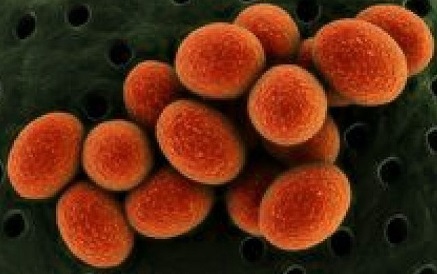Berberine as a Potential Treatment for Streptococcus Suis Meningitis in Humans and Pigs
Nikhil Prasad Fact checked by:Thailand Medical News Team Feb 21, 2025 1 month, 2 weeks, 6 days, 5 hours, 11 minutes ago
Medical News:
A Natural Compound Shows Promise Against Deadly Meningitis
Streptococcus suis is a serious bacterial infection that affects both pigs and humans. While commonly associated with the swine industry, this infection is increasingly being recognized as a global health concern, especially in countries where close human contact with pigs is common. A recent study conducted by researchers from Wuhan Polytechnic University and Huazhong Agricultural University in China has explored the potential of berberine, a plant-derived compound, in treating Streptococcus suis meningitis.
 Berberine as a Potential Treatment for Streptococcus Suis Meningitis in Humans and Pigs
Berberine as a Potential Treatment for Streptococcus Suis Meningitis in Humans and Pigs
This
Medical News report highlights how berberine, a natural substance found in various medicinal plants, may offer an effective alternative treatment against this life-threatening bacterial infection. The study utilized advanced computational methods to analyze the impact of berberine at a molecular level, providing key insights into how it interacts with the infection in both humans and pigs.
Understanding Streptococcus suis Meningitis
Streptococcus suis is a bacterial pathogen that primarily affects pigs but can also infect humans, particularly those working in the swine industry. It spreads through direct contact with infected pigs or consumption of undercooked pork. In humans, the infection can lead to serious health complications, including septicemia, arthritis, pneumonia, and meningitis. Meningitis caused by Streptococcus suis is particularly dangerous, as it can result in long-term neurological damage or even death.
In past outbreaks, the disease has caused significant public health crises. For example, a major outbreak in Sichuan, China, led to 215 reported cases, with nearly half of the infected individuals suffering from meningitis. Given the increasing number of human cases, researchers are searching for effective treatments beyond conventional antibiotics, which face challenges due to bacterial resistance.
How Berberine Works Against Streptococcus suis
Berberine is a naturally occurring alkaloid with a long history in traditional medicine, known for its anti-inflammatory, antioxidant, and antibacterial properties. To better understand how berberine combats Streptococcus suis meningitis, the researchers applied network pharmacology, an advanced computational method that analyzes drug interactions at a molecular level.
Their findings identified 31 potential targets through which berberine exerts its effects. Among the most critical are Toll-like receptor 4 (TLR4), fibronectin 1 (FN1), superoxide dismutase 1 (SOD1), and catalase (CAT). These proteins play significant roles in controlling inflammation and oxidative stress, both of which are central to the progression of bacterial meningitis.
Additionally, molecular docking studies showed that berberine has a strong binding ability with these targets, suggesting that it can help reduce inflammation and strengthen the immune response agai
nst Streptococcus suis. Importantly, the study also demonstrated that berberine is capable of crossing the blood-brain barrier, making it a promising candidate for treating meningitis, which primarily affects the brain and central nervous system.
The Role of Inflammation and Oxidative Stress
One of the key mechanisms by which Streptococcus suis causes meningitis is through triggering excessive inflammation and oxidative stress. TLR4, one of the main proteins identified in the study, is known to activate inflammatory pathways when responding to bacterial infections. When overstimulated, this process leads to excessive inflammation, which can worsen brain damage in meningitis patients.
Another protein, FN1, has been linked to blood-brain barrier dysfunction, a critical factor in the development of bacterial meningitis. Overexpression of FN1 can lead to increased permeability of the barrier, making it easier for bacteria to penetrate the brain. Berberine appears to regulate these proteins, helping to restore the body's natural defenses against infection.
Additionally, oxidative stress - a condition caused by an imbalance between free radicals and the body's ability to neutralize them - is another major factor in the severity of Streptococcus suis infections. The study found that berberine enhances the activity of antioxidant enzymes such as SOD1 and CAT, which work to counteract oxidative damage. This suggests that berberine not only fights infection but also helps protect brain cells from further damage.
Implications for Human and Veterinary Medicine
These findings hold significant promise for both human and veterinary medicine. In the agricultural sector, Streptococcus suis infections cause substantial economic losses due to pig mortality and reduced productivity. The ability of berberine to act as an alternative or supplementary treatment could help reduce the reliance on antibiotics in pig farming, addressing the growing issue of antibiotic resistance.
For human medicine, berberine's ability to cross the blood-brain barrier and directly target inflammatory and oxidative stress pathways suggests that it could be developed into an effective treatment for bacterial meningitis. Future clinical trials will be necessary to confirm its efficacy and safety for use in human patients.
Conclusion
The study highlights the potential of berberine as a novel treatment for Streptococcus suis meningitis. Through its anti-inflammatory and antioxidant properties, berberine may help regulate key proteins involved in the disease while also reducing oxidative damage. By providing a natural alternative to antibiotics, this research opens new avenues for both human and veterinary medicine.
As further studies continue, the potential for berberine-based treatments could significantly improve outcomes for those affected by this dangerous bacterial infection.
The study findings were published in the peer-reviewed journal: Toxics.
https://www.mdpi.com/2305-6304/13/2/138
For the latest COVID-19 News, keep on logging to Thailand
Medical News.
Read Also:
https://www.thailandmedical.news/news/meningitis-outbreak-in-ghana-causes-16-deaths-60-suspected-cases-and-22-confirmed-cases
https://www.thailandmedical.news/news/growing-concerns-over-deadly-meningitis-outbreak-in-northern-ghana
https://www.thailandmedical.news/news/mysterious-meningitis-outbreak-in-yobe-nigeria-kills-20-students-while-hundreds-more-infected
https://www.thailandmedical.news/pages/thailand_doctors_listings
